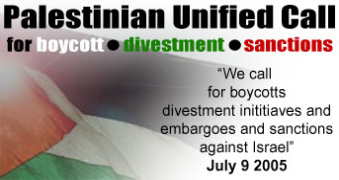The First Resolution for Total Divestment from Apartheid Israel - at Wayne State University
Students Movement for Justice
April 17, 2013
ANGRY ARAB NEWS SERVICE
On this day ten years ago Wayne State University’s student council became the first in the US to pass a resolution calling on its school to divest from companies doing business in Israel. The resolution passed 9 to 7 following a year-long solidarity campaign on the Detroit campus, organized by Students Movement for Justice (SMJ), in the form of protests, mock refugee camps, mock apartheid walls, guest speakers and a“die-in.” Subsequently, similar resolutions were passed by student councils at the University of Michigan-Dearborn, Hampshire College, Evergreen State College and more recently UC San Diego, UC Riverside, and UC Irvine.
The tenth year anniversary prompts us to reflect on the divestment resolution and make a few observations. First, the resolution’s language, like the discourse adopted by SMJ throughout its activism on campus, was unequivocal. It expressly referred to “violent ethnic cleansing,” the annihilation of “thousands of occupied Palestinians” and “apartheid.” The group had no interest in adopting a “strategy” of calling for the liberation of only 22% of historic Palestine in the West Bank and Gaza. Its language clearly rejected the “strategy” of dialogue with Zionists. This uncompromising approach predictably resulted in verbal and physical hostility from Zionists on campus. These incidents were documented on the pages of The South End, the campus newspaper. But we were not deterred. Zionists’ sensibilities were not on our list of priorities.
Second, until it was actually passed, SMJ’s members had no way of guessing how the Wayne State student council would vote on the resolution. Regardless, there was no reason to postpone presenting the resolution pending our certainty that it would pass. Had the resolution failed, it would have been to the university’s historical discredit. At least the divestment resolution would speed the day when the university finally bent to the unpopularity of investment in land theft, just as apartheid South Africa became an increasingly unpopular investment throughout the 1980’s.
Third, SMJ was an egalitarian grassroots movement, not a hierarchical organization. It believed in all students’ right to participate in political activism equally. For example, no one person had a monopoly on chants at on-campus protests. Instead, a platform was offered to everyone who wanted to address the protesters. This empowered students to participate. Decision-making at meetings was democratic. The group wasn’t concerned with titles or electing officers to executive positions.
Fourth, SMJ refused to sever Palestine from the other causes it stood for, even if that resulted in a slightly smaller number of members. SMJ chanted for Palestine’s freedom at the on-campus antiwar protest it held on the first day of the invasion of Iraq. It worked with Black leaders on campus and supported their fight for affirmative action. The Black students were among Palestine’s staunchest allies on campus. This is no surprise considering the anti-Zionist legacy of Malcolm X, of the Black Panthers and of SNCC starting in 1967. This also enabled us to connect Detroit to Palestine.
The tight Israeli alliance to apartheid South Africa is not forgotten in Detroit. We pointed out the bitter irony of living in a forcibly impoverished U.S. inner city while the U.S. government spent billions of dollars to prop up apartheid Israel and its Klan-style occupation forces. A decade later, we are optimistic about the future of Palestine activism on US campuses. Pro-Palestine activists can connect more easily now; social networking didn’t exist when the Wayne State resolution passed in 2003. Now in 2013, a string of campus divestment resolutions are shattering the illusion of Zionists’ invincibility, and are building the self-confidence of pro-Palestine activists.
We wish to thank the Palestinian people, who were waging the second intifada ten years ago, for inspiring us to deliver their message to our fellow students. Their brave example guided our political activism culminating in a victory we will remember for a long time.
*********************************************


No comments:
Post a Comment